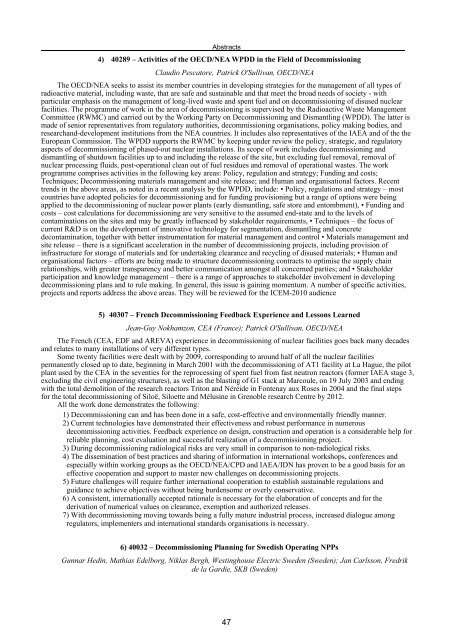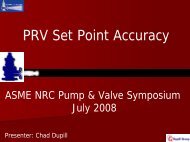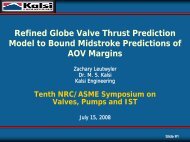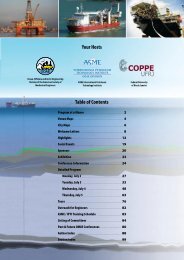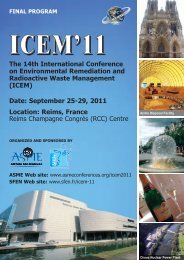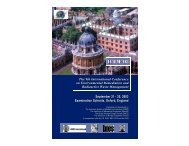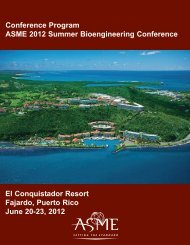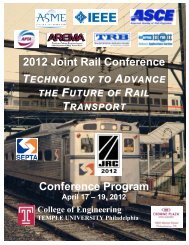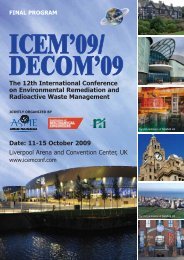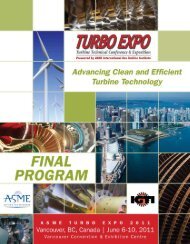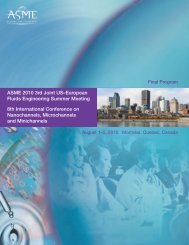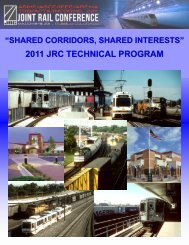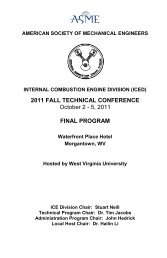The 13th International Conference on Environmental ... - Events
The 13th International Conference on Environmental ... - Events
The 13th International Conference on Environmental ... - Events
You also want an ePaper? Increase the reach of your titles
YUMPU automatically turns print PDFs into web optimized ePapers that Google loves.
Abstracts<br />
4) 40289 – Activities of the OECD/NEA WPDD in the Field of Decommissi<strong>on</strong>ing<br />
Claudio Pescatore, Patrick O'Sullivan, OECD/NEA<br />
<str<strong>on</strong>g>The</str<strong>on</strong>g> OECD/NEA seeks to assist its member countries in developing strategies for the management of all types of<br />
radioactive material, including waste, that are safe and sustainable and that meet the broad needs of society - with<br />
particular emphasis <strong>on</strong> the management of l<strong>on</strong>g-lived waste and spent fuel and <strong>on</strong> decommissi<strong>on</strong>ing of disused nuclear<br />
facilities. <str<strong>on</strong>g>The</str<strong>on</strong>g> programme of work in the area of decommissi<strong>on</strong>ing is supervised by the Radioactive Waste Management<br />
Committee (RWMC) and carried out by the Working Party <strong>on</strong> Decommissi<strong>on</strong>ing and Dismantling (WPDD). <str<strong>on</strong>g>The</str<strong>on</strong>g> latter is<br />
made of senior representatives from regulatory authorities, decommissi<strong>on</strong>ing organisati<strong>on</strong>s, policy making bodies, and<br />
researchand-development instituti<strong>on</strong>s from the NEA countries. It includes also representatives of the IAEA and of the the<br />
European Commissi<strong>on</strong>. <str<strong>on</strong>g>The</str<strong>on</strong>g> WPDD supports the RWMC by keeping under review the policy, strategic, and regulatory<br />
aspects of decommissi<strong>on</strong>ing of phased-out nuclear installati<strong>on</strong>s. Its scope of work includes decommissi<strong>on</strong>ing and<br />
dismantling of shutdown facilities up to and including the release of the site, but excluding fuel removal, removal of<br />
nuclear processing fluids, post-operati<strong>on</strong>al clean out of fuel residues and removal of operati<strong>on</strong>al wastes. <str<strong>on</strong>g>The</str<strong>on</strong>g> work<br />
programme comprises activities in the following key areas: Policy, regulati<strong>on</strong> and strategy; Funding and costs;<br />
Techniques; Decommissi<strong>on</strong>ing materials management and site release; and Human and organisati<strong>on</strong>al factors. Recent<br />
trends in the above areas, as noted in a recent analysis by the WPDD, include: • Policy, regulati<strong>on</strong>s and strategy – most<br />
countries have adopted policies for decommissi<strong>on</strong>ing and for funding provisi<strong>on</strong>ing but a range of opti<strong>on</strong>s were being<br />
applied to the decommissi<strong>on</strong>ing of nuclear power plants (early dismantling, safe store and entombment), • Funding and<br />
costs – cost calculati<strong>on</strong>s for decommissi<strong>on</strong>ing are very sensitive to the assumed end-state and to the levels of<br />
c<strong>on</strong>taminati<strong>on</strong>s <strong>on</strong> the sites and may be greatly influenced by stakeholder requirements, • Techniques – the focus of<br />
current R&D is <strong>on</strong> the development of innovative technology for segmentati<strong>on</strong>, dismantling and c<strong>on</strong>crete<br />
dec<strong>on</strong>taminati<strong>on</strong>, together with better instrumentati<strong>on</strong> for material management and c<strong>on</strong>trol • Materials management and<br />
site release – there is a significant accelerati<strong>on</strong> in the number of decommissi<strong>on</strong>ing projects, including provisi<strong>on</strong> of<br />
infrastructure for storage of materials and for undertaking clearance and recycling of disused materials; • Human and<br />
organisati<strong>on</strong>al factors – efforts are being made to structure decommissi<strong>on</strong>ing c<strong>on</strong>tracts to optimise the supply chain<br />
relati<strong>on</strong>ships, with greater transparency and better communicati<strong>on</strong> am<strong>on</strong>gst all c<strong>on</strong>cerned parties; and • Stakeholder<br />
participati<strong>on</strong> and knowledge management – there is a range of approaches to stakeholder involvement in developing<br />
decommissi<strong>on</strong>ing plans and to rule making. In general, this issue is gaining momentum. A number of specific activities,<br />
projects and reports address the above areas. <str<strong>on</strong>g>The</str<strong>on</strong>g>y will be reviewed for the ICEM-2010 audience<br />
5) 40307 – French Decommissi<strong>on</strong>ing Feedback Experience and Less<strong>on</strong>s Learned<br />
Jean-Guy Nokhamz<strong>on</strong>, CEA (France); Patrick O'Sullivan, OECD/NEA<br />
<str<strong>on</strong>g>The</str<strong>on</strong>g> French (CEA, EDF and AREVA) experience in decommissi<strong>on</strong>ing of nuclear facilities goes back many decades<br />
and relates to many installati<strong>on</strong>s of very different types.<br />
Some twenty facilities were dealt with by 2009, corresp<strong>on</strong>ding to around half of all the nuclear facilities<br />
permanently closed up to date, beginning in March 2001 with the decommissi<strong>on</strong>ing of AT1 facility at La Hague, the pilot<br />
plant used by the CEA in the seventies for the reprocessing of spent fuel from fast neutr<strong>on</strong> reactors (former IAEA stage 3,<br />
excluding the civil engineering structures), as well as the blasting of G1 stack at Marcoule, <strong>on</strong> 19 July 2003 and ending<br />
with the total demoliti<strong>on</strong> of the research reactors Trit<strong>on</strong> and Néréide in F<strong>on</strong>tenay aux Roses in 2004 and the final steps<br />
for the total decommissi<strong>on</strong>ing of Siloë, Siloette and Mélusine in Grenoble research Centre by 2012.<br />
All the work d<strong>on</strong>e dem<strong>on</strong>strates the following:<br />
1) Decommissi<strong>on</strong>ing can and has been d<strong>on</strong>e in a safe, cost-effective and envir<strong>on</strong>mentally friendly manner.<br />
2) Current technologies have dem<strong>on</strong>strated their effectiveness and robust performance in numerous<br />
decommissi<strong>on</strong>ing activities. Feedback experience <strong>on</strong> design, c<strong>on</strong>structi<strong>on</strong> and operati<strong>on</strong> is a c<strong>on</strong>siderable help for<br />
reliable planning, cost evaluati<strong>on</strong> and successful realizati<strong>on</strong> of a decommissi<strong>on</strong>ing project.�<br />
3) During decommissi<strong>on</strong>ing radiological risks are very small in comparis<strong>on</strong> to n<strong>on</strong>-radiological risks.<br />
4) <str<strong>on</strong>g>The</str<strong>on</strong>g> disseminati<strong>on</strong> of best practices and sharing of informati<strong>on</strong> in internati<strong>on</strong>al workshops, c<strong>on</strong>ferences and<br />
especially within working groups as the OECD/NEA/CPD and IAEA/IDN has proven to be a good basis for an<br />
effective cooperati<strong>on</strong> and support to master new challenges <strong>on</strong> decommissi<strong>on</strong>ing projects.�<br />
5) Future challenges will require further internati<strong>on</strong>al cooperati<strong>on</strong> to establish sustainable regulati<strong>on</strong>s and<br />
guidance to achieve objectives without being burdensome or overly c<strong>on</strong>servative.<br />
6) A c<strong>on</strong>sistent, internati<strong>on</strong>ally accepted rati<strong>on</strong>ale is necessary for the elaborati<strong>on</strong> of c<strong>on</strong>cepts and for the<br />
derivati<strong>on</strong> of numerical values <strong>on</strong> clearance, exempti<strong>on</strong> and authorized releases.<br />
7) With decommissi<strong>on</strong>ing moving towards being a fully mature industrial process, increased dialogue am<strong>on</strong>g<br />
regulators, implementers and internati<strong>on</strong>al standards organisati<strong>on</strong>s is necessary.<br />
6) 40032 – Decommissi<strong>on</strong>ing Planning for Swedish Operating NPPs�<br />
Gunnar Hedin, Mathias Edelborg, Niklas Bergh, Westinghouse Electric Sweden (Sweden); Jan Carlss<strong>on</strong>, Fredrik<br />
de la Gardie, SKB (Sweden)<br />
47


